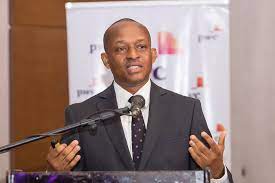Accounting and auditing firm, PwC, has reminded the government to review the rate for the Electronic Transaction Levy (E-levy) to not more than 0.75%.
It also wants the implementation of the levy to be reviewed.
This according to the firm, is due to the downward adjustment of the e-levy revenue target by over 91%, from ₵6.9 billion to ₵0.6 billion.
"The downward revision of the e-levy revenue target by over 91% (from ₵6.9 billion to ₵0.6 billion) indicates the need for a review of the policy and its implementation. We wish to remind government of our call for the e-levy rate to not exceed the rates typically charged by resident platform operators of not more than 0.75%."
In its commentary on the 2022 Mid-Year Budget, PwC said while the benefit of increased global oil prices has helped to support the budget in the short term, the fundamental and perennial challenge around revenue mobilisation, and the need to significantly improve the country’s tax to Gross Domestic Product (GDP) ratio persists and still needs to be confronted.
“This, in our view, continues to be the driver for the additional revenue measures, which government has indicated it will pursue in the second half of 2022”.
The previous revenue and grants target of GH₵100.5 billion for 2022 has been revised to GH₵96.8 billion, a 3.7% reduction. This still translates into a growth target of 37% relative to the 2021 performance (GH₵70.9 billion).
PwC said the revised target is expected to be achieved mainly as a result of the windfall in revenue from oil production and exports, a result of increased global oil prices. This it believes will help to significantly offset shortfalls from other revenue sources, particularly tax revenues.
It is also expected to enhance government’s fiscal consolidation programme.
Given that government’s engagement with the International Monetary Fund has only just commenced, PwC, said it is too early to expect a detailed plan for the recovery of the economy in the medium term.
“It is therefore not surprising that the mid-year review does not provide such a plan; however, the review makes it clear that any eventual agreement with the IMF will be based on an Enhanced Domestic programme that will complement the previously announced Ghana COVID-19 Alleviation and Revitalisation of Enterprises Support (CARES) “Obaatan Pa” programme”.
Cedi depreciation pushes Ghana’s debt high
Ghana’s total debt stood at GH₵393.5 billion, representing 78.3% of GDP as of 30th June, 2022, with about 51.7% of this position being financed by external debt.
Despite the country’s debt stock in dollar terms reducing by 7.2% from $58.6 billion as of June 2021 to US$54.4 billion as of June 2022, PwC said the significant depreciation of the cedi by about 16% over the period has contributed significantly to the rising debt position.
Overall, PwC said the mid-year review indicates clearly where the current challenges lie for the Ghanaian economy.
“These are not new challenges - revenue generation continues to require additional impetus as does an overall rebalancing of our expenditure prolife, which has resulted in the current debt burden. For 2022, thanks mainly to increased global oil prices, the measures and revised budgets outlined in the mid-year review look achievable.”
“The real question is what the medium to long term plan is to deal with the fundamental challenges we need to confront. The Ghana CARES programme sets out government’s plan for the transformation of the economy. An Enhanced Domestic Programme, which we understand that government is currently developing, will complement the Ghana CARES Programme. These will form the basis of discussion and ultimately, agreement with the IMF on a medium-term road map and the IMF’s support to Ghana’s economy”, it added.
“While we await the details of the plan and the outcome of discussions with the IMF, we encourage government to maintain its resolve on the implementation of the expenditure cuts that it has identified and to the implementations of the revenue measures that have been approved as part of the 2022 Budget”, it concluded.
Latest Stories
-
Street begging crackdown to expand beyond Accra – Interior Minister
5 minutes -
You can’t fix trade deficits with tarrifs – Bawumia cautions
28 minutes -
Africa’s energy crisis rooted in leadership failures, not poverty – Experts
35 minutes -
Ghanaian pilgrim dies while performing Hajj in Makkah
1 hour -
2 arrested, one on the run for stealing iron rods from Agenda 111 site
1 hour -
Mahama announces plans to upgrade Greater Accra Regional Hospital to Teaching Hospital
1 hour -
GHS takes measures to check Mpox outbreak
2 hours -
Five dead after tornado tears through St Louis
2 hours -
Real Madrid confirm Dean Huijsen signing from Bournemouth
2 hours -
Delegates walk out of FIFA congress after Infantino arrives late from Trump trip
3 hours -
Mahama must seek legislative backing for Code of Conduct – Ahiagbah
3 hours -
John-Paul Adjadeh: The visionary behind Ghana’s Premier alumni games
3 hours -
Israel launches major offensive to ‘seize and control’ areas of Gaza
3 hours -
32 youth receive business starter packs from Ghana Grows
3 hours -
NSA Boss visits reptile-breeding Azumah Nelson Youth Centre
4 hours

